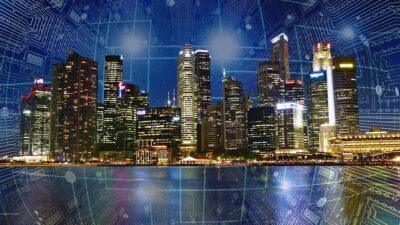Introduction
The Metaverse, a collective virtual shared space, is rapidly gaining attention as a frontier of digital interaction, economic activity, and social connection. Created by the convergence of virtual reality (VR), augmented reality (AR), blockchain technology, and digital economies, the Metaverse represents a transformative shift in how we interact with technology. As we stand on the cusp of this new digital landscape, it’s essential to explore the opportunities and challenges that the Metaverse economy presents.
Opportunities in the Metaverse Economy
1. New Business Models
The Metaverse offers a plethora of new business models. From virtual real estate sales, where users can buy, sell, and develop virtual properties, to offering services in virtual environments such as video gaming, training, and virtual events, the possibilities are endless. Companies can host virtual conferences, enabling them to reach a global audience without the costs and environmental impact of traditional travel.
2. Digital Goods and Services Market
With the rise of non-fungible tokens (NFTs), digital art, collectibles, and fashion have found a lucrative marketplace in the Metaverse. Creators can monetize their work directly, circumventing traditional intermediaries. This democratization of art and commerce opens up new revenue streams for artists and designers, enabling them to reach their audiences with minimal barriers.
3. Social and Collaborative Spaces
The Metaverse fosters unique social interactions, enabling users to meet, collaborate, and socialize in immersive environments. Businesses can leverage this to improve teamwork and collaboration, especially in remote working scenarios. Virtual team-building events, brainstorming sessions in 3D spaces, and interactive workshops can enhance employee engagement and productivity.
4. Learning and Education
Educational institutions are beginning to explore the Metaverse as a platform for immersive learning. Virtual classrooms and simulations can provide students with engaging and interactive experiences that enhance understanding. This could revolutionize the educational landscape, making learning more accessible and effective.
Challenges in the Metaverse Economy
1. Regulation and Governance
As the Metaverse grows, questions around governance, user safety, and regulation become increasingly important. Who is responsible for moderating content? How do we protect user data and ensure privacy? Moreover, the international nature of the Metaverse complicates regulatory frameworks, necessitating global cooperation.
2. Digital Divide
Despite its potential, the Metaverse economy risks exacerbating existing inequalities. Access to the necessary technology—high-speed internet, VR, and AR devices—is not universally available. If not addressed, this digital divide could lead to a scenario where only a segment of the population benefits from the Metaverse, leaving others behind.
3. Security Concerns
With the rise of digital economies come heightened concerns about cybersecurity. Users will be vulnerable to hacking, scams, and data breaches, resulting in financial losses and breaches of privacy. Developing robust security measures is crucial for ensuring user safety and trust within the Metaverse.
4. Mental Health Considerations
The immersive nature of the Metaverse can lead to over-exposure and negative psychological impacts for some users. Issues such as addiction, isolation, and the potential for diminished real-world social skills must be considered. Balancing the exciting aspects of a virtual existence with mental well-being is crucial for sustainable growth in this space.
Conclusion
The Metaverse economy presents a unique blend of opportunities and challenges that could redefine our digital and physical interactions. As enterprises and individuals venture into this new realm, proactive measures must be taken to navigate its complexities responsibly. By addressing the ethical, regulatory, and social implications of the Metaverse, we can unlock its potential while ensuring a future where everyone can participate in the benefits it offers.
As we continue to explore the Metaverse, ongoing dialogue between technologists, policymakers, educators, and users will be essential in shaping an inclusive and sustainable Metaverse economy for all.



